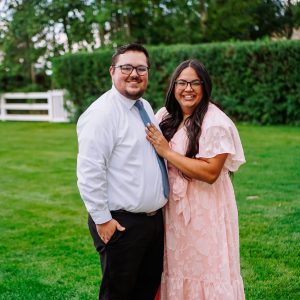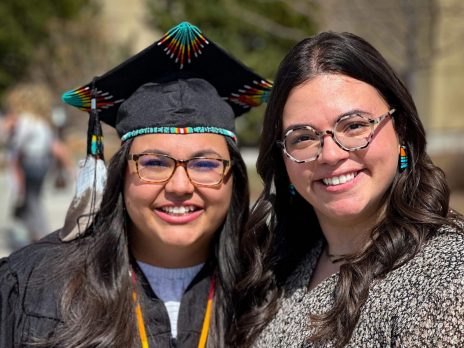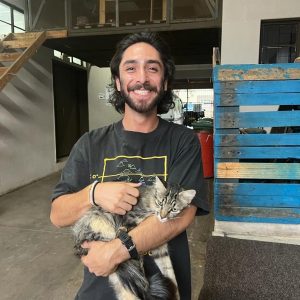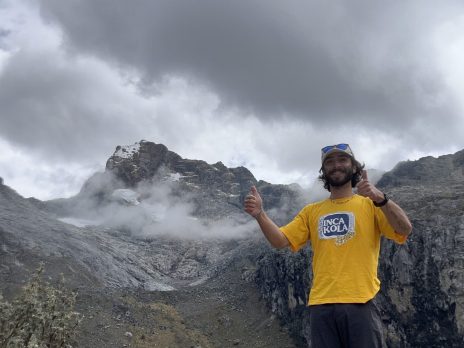October 24, 2025
New Semester, Fresh Perspectives
Get to know public health graduate research assistants Brighten Crawford and Nick Calles
Welcome back Fairness First readers!
After a summer away we’re excited to open the fall semester with a piece that features two of SHERC’s new graduate research assistants, Brighten Crawford and Nick Calles. Brighten and Nick are students in NAU’s Master of Public Health (MPH) Program, focusing on health promotion with an emphasis in Indigenous health. They will be supporting the Fairness First Campaign by producing Fit it in a Minute videos, writing blog posts, and coordinating events.
Graduate assistantships provide opportunities for students to develop research skills, work with teams, and contribute unique perspectives to projects. Working with SHERC’s Community Engagement Core, Nick and Brighten will help to cultivate collaborations with community based organizations and leaders in meaningful ways and foster awareness and participation in health research across Arizona. Get to know Brighten and Nick!
Meet Brighten Crawford

Brighten Crawford is a member of the Assiniboine and Sioux Tribes from the Fort Peck Indian Reservation in Montana. She has twelve siblings and is close with her family. Married to her best friend for three and a half years, Brighten and her husband have lots of plants and two dogs. She earned a Bachelors of Science in Public Health from Brigham Young University-Idaho. Her time in Idaho and working with her tribal community cemented Brighten’s drive to develop herself as a resource for her family, community and beyond.
Are there aspects of your background or identity that influence your work?
BC: My siblings have a major influence on my academic journey and research interests. I want to inspire them and continue to learn from them because we pave the way for each other. I have worked with youth, children, and individuals with disabilities – I am constantly amazed at their strength and resilience. I particularly see the youth as powerful people who will carry forward the dreams I have for my people, in more efficient and effective ways. My work is centered around how I can contribute to preparing the world for the Seven Generations* who are to come.
*Seven Generations: A teaching in many Indigenous cultures that talks about the need to consider our impacts on others, the environment, and future generations. This concept illustrates the importance of reflecting on interconnection and interdependence with those who come before and after us.

What are you most excited to learn about as an MPH student?
BC: I want to use the time during my MPH to deepen my understanding of community-led research and evaluation. I want to further explore how data, stories, and relationships work together to amplify community voices, support their self-determined goals and ultimately guide meaningful action with communities not for communities.
How do the goals of SHERC’s Community Engagement Core connect to your own goals?
BC: I see relationship building as the most important part of capacity building with partner organizations and communities. This is exactly what CEC is all about! In my previous experience with Allyson Kelley and Associates, I developed skills as a collaborator, evaluator, and researcher. I want to continue to grow those skills and learn more about creating innovative and sustainable health initiatives.
What inspired you to pursue education in public health?
BC: I have always been interested in how individual experiences connect to larger systems, and public health helps me to bridge those two worlds. Growing up, I saw first hand how health challenges impacted individuals, families, and communities. Those experiences taught me that healing and wellness happen through connection and I wanted to be a part of that process. It also helps that my brain thinks in systems and notices patterns so I’m constantly curious about how small changes can ripple through and improve the bigger picture.
What do you like to do in your free time?
BC: My favorite thing to do in my free time is to be with my family. Here at NAU, I am very far from my siblings so I rely on video calls and our family Snapchat groups to maintain connection. Recently, I have tried to learn how to play Minecraft so I can spend more time with my brothers. I taught myself how to crochet earlier this year and I enjoy that. I also like to paint, sing, play pickleball with my husband, take care of my plants, and teach my dogs new tricks.
Who is someone you look up to?
BC: I have two people I look up to the most – my dad and my husband. My dad has a gift for grounding people and reminding them of what is important. He is not a loud person, but when he enters a room or speaks you can feel it. He is a humble and powerful leader. He often reminds me that I am part of something bigger than myself and that everything we have belongs to the Creator. I look up to my husband because he really is the best part of me. He is so kind and patient. He is intentional about loving people where they are and as they are. He keeps me going and helps me to stay positive.
Meet Nick Calles

This is Nick’s first time at NAU! He spent his life living throughout South America and Washington, D.C., which helped him develop a global perspective on how people and systems interact. Prior to NAU, he attended the University of British Columbia (UBC) in Vancouver, where he earned his bachelor’s degree in anthropology*. Nick also served with the Peace Corps in Namibia – located on the southeastern coast of Africa – working with 4th-6th graders. Both experiences shaped his vision of public health as a field rooted in collaboration, cultural understanding, and community empowerment.
*Anthropology: The study of humans, past and present, focusing on how people live, think, and interact across different cultures and time periods.
What are you most excited to learn about as an MPH student?
NC: Biostatistics captured my attention more than I expected. Through physics classes in high school, I came to really like math and how much more grounded it felt compared to the more abstracted language and thinking I was involved in. Statistics provides a way to “narrativize numbers” and turn data into meaningful insights about real world health trends. I really appreciate how biostatistics challenges me to think differently and how it bridges quantitative evidence with human experiences.
How do the goals of SHERC’s Community Engagement Core connect to your own goals?
NC: I’m really looking forward to the opportunity to learn directly from experienced researchers and practitioners who have dedicated their careers to community-engaged work, and getting to observe in real time how they build partnerships and navigate complex community dynamics. I’m grateful to be part of a team that values relationships, learning, and mutual respect, which are instrumental in how I hope to develop my own thinking and practice.
What inspired you to pursue education in public health?
NC: My time at UBC helped me explore how culture, social structures, and policy influence people’s lives. I specifically became interested in how lower-income communities engage with healthcare systems, and how that becomes a unique culture in itself. After my undergrad, I went into the Peace Corps in Namibia, which further reinforced my drive as I engaged firsthand with structural and social determinants of health* that affected my students and the community more broadly, and in turn the collaborative process of individual and community capacity building.
*Social determinants of health (SDOH): The conditions in the environments where people are born, live, learn, work, play, worship, and age.
What do you like to do in your free time?
NC: I realized a while back that running was and is a great way for me to stay sane. That, and hiking, have always been really good ways for me to get outside and use my body and not have to really think about anything other than what’s right in front of me. I’m also getting into painting, though I’m not very good at it, but I don’t really care because it’s a new thing to practice and that’s sort of exciting. I also read a lot, which is terrible for my already degrading eyes, but oh well. I’m reading Desert Solitaire by Edward Abbey at the moment which has been very interesting, given the area we’re in up here.

Who is someone you look up to?
NC: I really think André 3000 (the American rapper, singer, record producer, and actor) is one of the most interesting people. His creativity and perpetual reinvention throughout his career has been really cool to observe. He’s someone who never stops evolving, experimenting, and challenging boundaries and becoming more himself, which is something I want to bring more into both my personal and professional life. There’s no peak if there’s always a new mountain to climb.
Are there aspects of your background or identity that influence your work?
NC: Growing up as a perpetual third-culture kid,* I want to bring a global and cross-cultural perspective to my studies and professional work. I’m really interested in integrating knowledge and practices from different parts of the world and I want to bridge research across cultures and territories for the sake of overall betterment, collaboration, equitable access, and representation in public health research.
*Third-culture kids: Kids who spend a significant part of their childhood and formative years in places and/or cultures that are different from their parents’ home countries or cultures.
Interested in learning more about community health research at NAU?
Visit CHER’s social media for short stories that highlight SHERC researchers, students, lab spaces, and more! Look for “Fit it in a Minute” posts.